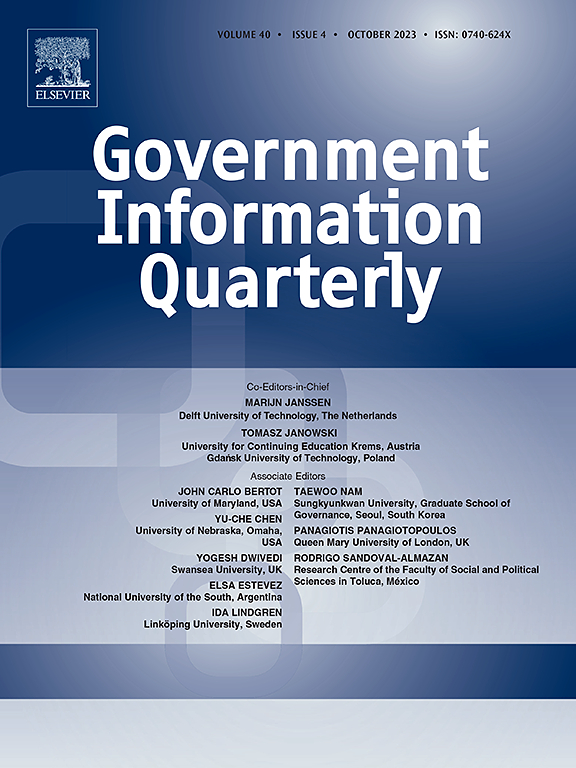引入横向战略互动:电子参与优先化的责任规避与地方政府从众策略
IF 10
1区 管理学
Q1 INFORMATION SCIENCE & LIBRARY SCIENCE
引用次数: 0
摘要
近年来,地方政府在电子参与改革中的矛盾心理和战略行为引起了学术界的广泛关注,但对地方政府之间的横向战略互动却缺乏足够的关注,这对电子参与改革的有效性有着显著的影响。本研究旨在以中国电子参与改革为例,填补这一空白。通过研究电子参与中复杂的政权内部官僚动态,我们认为地方政府面临着电子参与困境,使责任规避(BA)成为实施电子参与任务的主要动机。此外,我们认为地方政府倾向于采用一种特殊的BA策略,即从众策略来应对这一困境。此外,作为一种重要的非正式政治制度,赞助关系削弱了他们参与从众战略的倾向。我们利用一个独特的省级政府电子参与政策优先级数据集,通过面板数据空间计量模型进行实证分析,获得了支持我们理论的有力证据。本文章由计算机程序翻译,如有差异,请以英文原文为准。
Bringing in horizontal strategic interactions: Blame avoidance and local governments' bandwagon strategy in prioritizing E-participation
While local governments' ambivalence toward and strategic behaviors in e-participation reforms have recently attracted surging scholarly attention, insufficient scholarly attention has been paid to horizontal strategic interactions among local governments, which have salient implications for the effectiveness of e-participation reforms. This research aims to fill this gap using the case of China's e-participation reform. By examining the complex intra-regime bureaucratic dynamics in e-participation, we assert that local governments are confronted with an e-participation dilemma, making blame avoidance (BA) the primary motivation in implementing e-participation mandates. Furthermore, we argue that local governments tend to adopt a particular BA strategy, the bandwagon strategy, to cope with the dilemma. Additionally, patronage ties, a crucial informal political institution, weaken their tendency to engage in the bandwagon strategy. Using a unique dataset on provincial governments' e-participation policy priorities, our empirical analyses with panel data spatial econometric models obtain robust evidence that supports our theory.
求助全文
通过发布文献求助,成功后即可免费获取论文全文。
去求助
来源期刊

Government Information Quarterly
INFORMATION SCIENCE & LIBRARY SCIENCE-
CiteScore
15.70
自引率
16.70%
发文量
106
期刊介绍:
Government Information Quarterly (GIQ) delves into the convergence of policy, information technology, government, and the public. It explores the impact of policies on government information flows, the role of technology in innovative government services, and the dynamic between citizens and governing bodies in the digital age. GIQ serves as a premier journal, disseminating high-quality research and insights that bridge the realms of policy, information technology, government, and public engagement.
 求助内容:
求助内容: 应助结果提醒方式:
应助结果提醒方式:


